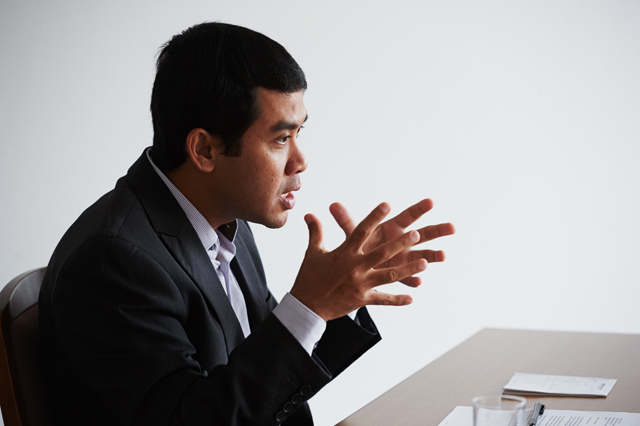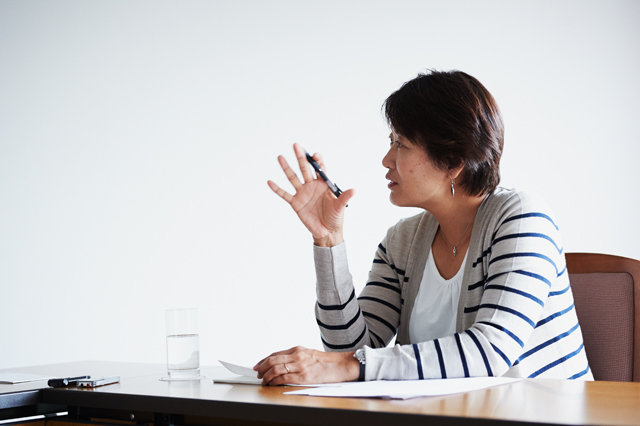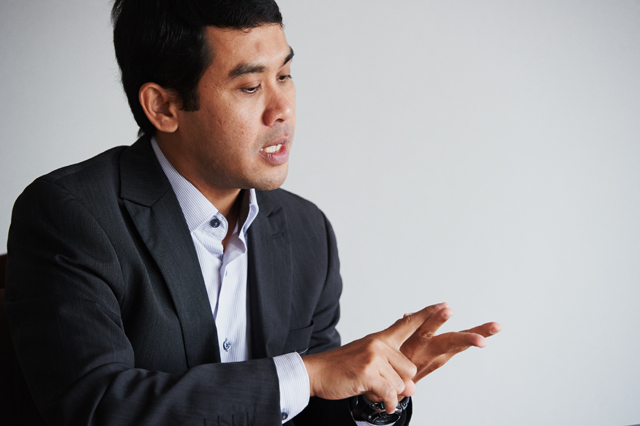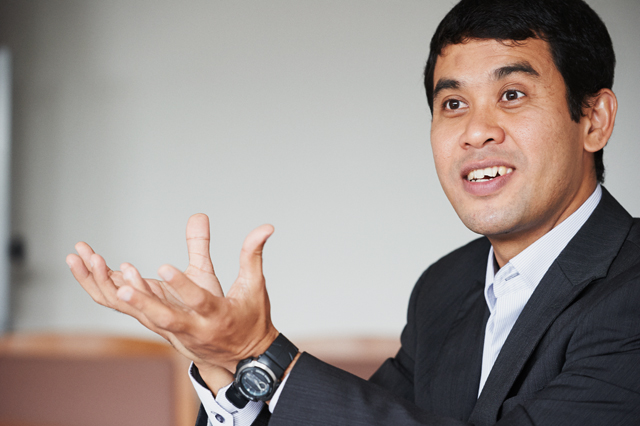Challenges in the Indonesian Society and the True Jihad
Emiko: I now understand why you are so enthusiastic about education. Now I would like to ask you about the currently emerging issues in Indonesia and how you are tackling them.

Ayang: Some issues of intolerance have been observed in the last ten years. There were attacks against religious minorities such as the Christian, Catholic, Shiite-Muslim, and Ahmadiyya-Muslim*1 communities. Scholars from State Islamic Universities (UIN/IAIN/STAIN) and ulama [religious scholars] from Nahdlatul Ulama (NU), Muhamadiyah, and other Muslim civil society organizations are struggling to defend the minority's rights and everybody's beliefs in order to show that democracy still prevails.
*1 Ahmadiyya is an Islamic religious branch founded in the second half of the nineteenth century in India by Mirza Ghulam Ahmad (1835-1908) which is considered heretic by the majority of Muslims in the world.
Now, we are close to the regional election in Jakarta.*2 The incumbent is of Christian-Chinese descent, and the two challengers—one is Muslim-Arab descent and the other is Javanese-Muslim—are perceived as indigenous Indonesian. Some Muslim splinter groups and Muslim politicians use Islam as a political means to counter this incumbent because of his ethnicity and religion. Peaceful demonstrations that abide by the law are allowed according to the principles of democracy in Indonesia. But what I criticize and disagree with is how some ulama and vocal minority Muslims organizations target this incumbent just because of ethnic and religious reasons. I cannot tolerate this.
*2 On February 15th, 2017, the first round of the gubernatorial election was held in Jakarta to elect the Governor of Jakarta.
Bringing in religion into the political arena is very dangerous because politics is something of the mundane. Attacking the mundane with the sacred to justify your actions is tremendously fatal and perilous. Those politicized Muslims of the ancient Orde Baru [New Order regime of Suharto] are going to organize a large demonstration on November 4th*3 and December 2nd in Jakarta, saying that what they are doing is the "big jihad" against the non-Muslims. We are afraid that some provocative actors will make the demonstration too chaotic.
*3 On November 4th, 2016, violent conflict erupted in Jakarta as protesters demanding the ouster of the incumbent clashed with the police. At least 160 protestors and seventy-nine police officers were injured during the clash.

Emiko: I think in many places, the word "jihad" is frequently used for attacking other groups. Because of this, many people misunderstand Islam that it is a very violent religion or that its followers are extremists.
Ayang: Yes, I think one of the most misunderstood concepts in Islam is jihad. What the Daesh or ISIS is doing in the Middle Eastern countries has nothing to do with jihad. They hijacked Islam for their own agenda: they are using Islam, but they do not understand what Islam is. Jihad is not that what they are doing. What is happening in the Middle East has to do with economy and I don't want to speak about geopolitics and international relationships. But we are now seeing that using religion in politics is becoming the most effective and efficient destructive factor for one country. I think it is our own duty to educate Muslims that the best jihad is not going to war but to manage the waste, to provide clean water and employment, to give better education for our children, to lead a "rooted" life to contribute and support the nation. That is the true jihad.
Distinctiveness of Islam in Indonesia
Emiko: Let's talk more about Indonesia and Islam. Indonesian Islam is thought to be very moderate and tolerant. Is there a historic background for that? Is it different from Islam in other countries? And how do you think these characteristics have contributed in building the Indonesian society?
Ayang: The arrival of Islam to Indonesia was done in two stages. The first stage was the dakwah [indirect-proselytism] by Arab and Persian Muslim merchants who passed through the Indonesian archipelago, then called Nusantara, to go to the Far East. This happened until the twelfth century. The second stage was the direct-proselytism by devout Muslim preachers who yielded to the establishment of a Muslim community and Islamic political institution in the second half of thirteenth century in Aceh, Sumatra. The presence of the sultanate is confirmed by the discovery of the tombstone of its first sultan, Malik al-Saleh, dated 696 A.H. (1297 A.D.) These two stages of arrival of Islam were peaceful and gradual.
Emiko: You mean it was not by war or by invasion?

Ayang: That's right. Islam was carried into Nusantara by merchants and zealous Muslim proselytizers in a peaceful manner. From the beginning of its arrival, Islam in Indonesia is already very distinct. In addition, Islam was also smoothly adapted into the cultures and traditions of the archipelago too. I think the basic thing that makes Indonesian Islam different is how these indigenous cultures are deeply respected by Muslims. I sincerely do believe that indigenous cultures and traditions in the Indonesian archipelago have greatly contributed in shaping its moderate version of Islam. Beside that, I am assuming the nice tropical Indonesian weather has also greatly impacted Indonesian religious behavior since we do not have severe climate conditions—very hot weather in the summer or very cold weather in the winter—like in other Muslim countries in Eastern Europe, the Middle East, the Near East, North Africa, and South Asia.
Emiko: What are the teachings of Indonesian Islam like?
Ayang: Indonesian Islam or Islam Nusantara has three philosophical Islamic teachings: al-Ukhuwwah al-Islâmiyyah [solidarity of Muslim brotherhood], al-Ukhuwwah al-Basyariyyah [solidarity of human brotherhood], and al-Ukhuwwah al-Wathaniyyah [solidarity of nation brotherhood]. These three concepts of solidarity mean, "We are Muslim, but before being Muslim, we are human beings and brothers in this nation."
Indonesian Islam also promotes three values which are tawâzun [balance], tawassuth [moderation] and tasâmuh [tolerance], and among the three, I'd like to elaborate a bit on the first, tawâzun. In terms of the relationship between Islam and the state, Indonesia is neither a theocratic nor secular country: we are not a theocratic country like Saudi Arabia, Iran, Pakistan, Bangladesh, some states in Nigeria and so forth where their constitutions state very clearly that their countries are Islamic and that their constitutions follow sharia [Islamic] law. In our constitution, we do not say that we are an Islamic country or that Islam is the only official religion. We recognize six official religions, namely Islam, Protestantism, Catholicism, Hinduism, Buddhism, and Confucianism. And we also recognize hundreds of local beliefs. Having said that, we are not secular in the way that it is understood in France or Japan where a state or the government cannot intervene in religious matters. We make a balance between the two: that is one of the ways tawâzun is a valuable notion for us.
The Main Agents who Promote Moderate Islam in Indonesia
Ayang: In order to implement these teachings and values on the level of the nation state, two large Muslim mass organizations play important roles in Indonesia: Nahdlatul Ulama (NU) and Muhammadiyah. I myself serve as vice chairman for the Mosque Management Institute at NU. We don't exactly know the number of members and adherents of these two organizations. Some claim that Muhammadiyah has more than twenty to forty million members, while NU has between thirty to eighty million members. There are also many small- and medium-scaled Islamic organizations based in some Indonesian provinces such as Nahdlatul Wathan in West Nusa-Tenggara, al-Jamiyyatul Washliyyah in North Sumatra, al-Khairat in Central Sulawesi, Persatuan Islam in West-Java. Mathlaul Anwar in Banten, and al-Irsyad al-Islamiyyah and Jamiat al-Khayr in Jakarta. All these Islamic organizations are working very hard to disseminate and spread a peaceful, tolerant, and just Islam. The NU and Muhammadiyah have their own Islamic schools to educate Indonesian Muslims and they also have hospitals and orphanages located around the country.

Emiko: Not only schools, but hospitals and orphanages too? The roles of Islamic organizations in the people's lives in Indonesia are so big, isn't it?
Ayang: Yes. They have philanthropic associations too. They have a huge body of networks that empower and educate people in Indonesia which has greatly contributed to the success of Indonesian Islam. Happily, our government and these two organizations cooperate together.
NU and Muhammadiyah also have Islamic institutions which consist of madrasah [Islamic schools], pesantren [Islamic boarding schools], and Islamic universities. These institutions are owned either by the government or by the said Islamic organizations including NU and Muhammadiyah. These Islamic institutions contribute widely and largely to practice and teach what Indonesian Islam is. In the same vein, the State Islamic University in Jakarta where I come from and other State Islamic Universities in the country really act as a bulwark against fundamentalism and radicalism.
Intellectual Muslim figures and moderate ulama who lecture in universities, write in newspapers, or appear on national television are also important in defending and disseminating moderate Islam. Their writings and thinking are very influential. When I was at the State Islamic University in Jakarta, for example, publications by Muslim intellectuals, such as Nurcholish Madjid (also known as Cak Nur), Abdurrahman Wahid, former President of Indonesia (also known as Gus Dur), Ahmad Syafii Maarif, the former chairman of Muhammadiyah, and Jalaluddin Rahmat (also known as Kang Jalal) and by ulama such as Sahal Mahfudz, Ali Yafi, and Quraish Shihab influenced us very much. Especially the role of the ulama is important as they have deep knowledge on Islam and are considered to be the source of Islamic authority by the society.
These three elements—Islamic organizations, Islamic institutions, and intellectual Muslims and ulama—have been working together to shape and structure the identity of our Indonesian Islam. To sum up, Indonesian Islam is the convergence of Islam and local cultures. In other words, we take the essence of Islamic teachings so that it could interact positively and actively with local customs, wisdoms, and traditions. Taking Islam as a source of inspiration, values, norms, and ethics, we wrap it together with the local cultures. In this way, Islam would not contradict with local cultures.
Emiko: Do you think that Indonesian Islam could be a model for other Muslim countries?
Ayang: Yes. Indonesian Islam could show how Islam can interact actively and positively with local cultures. I would say that we might "export" the ideas of Indonesian Islam to other Muslim countries.

- Next Page
- Japan and Islam—The Halal Issue







